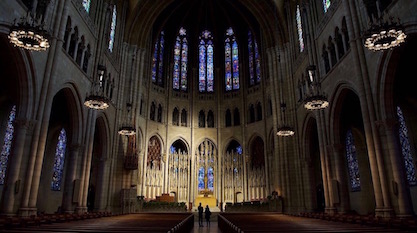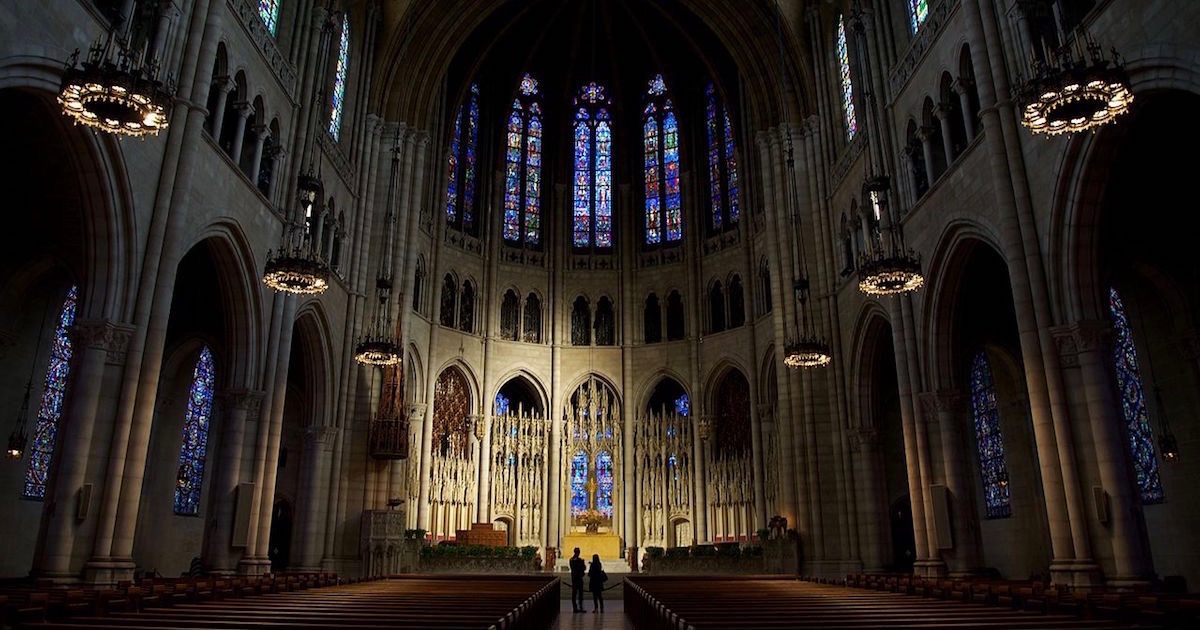 Evolution
Evolution
 Faith & Science
Faith & Science
How Naturalism Morphed into a State Religion


Key naturalist doctrines such as the multiverse cannot be established on the basis of evidence. As we have seen, however, naturalists (nature is all there is) are gradually becoming comfortable with setting aside the decision-making tools of science, such as testability, falsifiability, and Occam’s razor, in favor of acceptance of consensus. And they are happy to dismiss reason. In an age when few philosophers would wish to be called non-naturalists, key naturalist doctrines become unquestioned working assumptions. Approved science conveys acceptance of the doctrines.
Thus naturalism becomes a state church. Serious challenges to naturalism, no longer defensible on such discredited bases as evidence or reason, must be regarded as both treachery and heresy because no separation of church and state is envisioned.
You, reader, object of course: That scenario is not plausible!
No? In the 20th century, Marxist economic theories became a state religion. These theories were propounded and enforced for decades, and dissenters were punished, despite the fact that mass starvation was a common outcome. Hunger was predictable, predicted, and widely known. Thinkers naturally assumed that evidence and reason would prevail over enforcement and dogma. But when evidence is rejected, reason has little to work with. Eventually, reason does prevail but much else prevails meanwhile. And in that particular case, great scientists such as Einstein, Godel, and Lakatos were surprisingly complicit, knowingly or otherwise.
Admittedly, naturalism differs from most religions in its disdain for evidence in principle. As astrophysicist Ethan Siegel puts the matter at Forbes, the multiverse, for which no evidence may be possible, may be “the first physically motivated ‘metaphysics’ we’ve ever encountered.” By contrast, most religions have been established and defended on the basis of evidence. The evidence is often rejected by others or, at any rate, not considered decisive, but few have thought that they did not need any evidence.
Can naturalism reject all need for evidence or reason and still thrive as a state religion? If history can repeat itself, let’s keep an eye on some straws in the wind. We can see if any large number of them are blowing in any one direction and if their numbers increase over time.
One direction is scientism, the view that science (applied naturalism) should decide any question whatever. A recent incident in Canada, noted here by biophysicist Kirk Durston, is suggestive. Astronaut Julie Payette, a Canadian appointed as governor-general, chose a science policy convention earlier this month to ridicule those who doubt that life arose as a random process: “And we are still debating and still questioning whether life was a divine intervention or whether it was coming out of a natural process let alone, oh my goodness, a random process.” While Conservative opposition figures demurred, Liberal Prime Minister Justin Trudeau praised her performance, making clear that a person whose job is to foster national unity should ridicule non-naturalist views. Tellingly, Durston writes, Payette and Trudeau display these attitudes at a time when corruption “has reached crises proportions in certain areas of science itself, with a special nod to the biological sciences.” But then naturalist doctrines increasingly discount evidence in favor of support for naturalism.
Naturalism is beginning to display a number of other features of a state religion, one that is corrupt, fanatical, and insecure:
Reluctance to face institutional corruption or doctrinal problems honestly. We commonly hear, for example, that “science is self-correcting!” A more honest appraisal shows that there is no “uniform self-correcting mechanism.” If there were such a mechanism, a non-naturalist explanation would probably be required, along the lines of divine providence. Thus, an increasingly frequent defense, apart from ridicule of skeptics, is to simply attack the very basis of doubt by claiming that the consciousness from which doubt emerges is an illusion. As philosopher David Bentley Hart has written in The New Atlantis, the mental gymnastics required are “so preposterous as to verge on the deranged.” But caution: That was said decades ago about economic theories that starved millions. When an idea seems right for its time, it feels to many people like fate, not choice, and they respond simply by trying to escape its worst consequences for themselves.
Resistance to reform. We are told at Slate that more rigor in science today might do more harm than good because it would empower doubters of current orthodoxy. Meanwhile, alongside growing intolerance of findings not approved by the state cult, there is limitless tolerance for bizarre ideas that do fit. One thinks of cosmologist Sean Carroll’s musings on time at the Daily Galaxy:
Time is simply a concept that fits various physical models. But its origin is as much in metaphysics as in physics. … There is no “real” time, only models of time constructed in human awareness. Once we realize this simple fact, the capacity to move beyond all models, to truly lose our fear of death, come alive. The spiritual concept that we were never born and will never die then becomes viable, too.
Or the news at The Atlantic that “You Think With the World, Not Just Your Brain”: “Among philosophers, biologists, and cognitive scientists, this nightmare is an exciting new field of study, known as embodied or extended cognition.” The problem is not, of course, that these ideas are entertained but rather that the usual absence of dissenting voices, like David Bentley Hart’s, means that the jungle is never pruned.
Ruling out of order evidence that challenges the system. For example, the fact that we live at a time in the universe that is optimal for science observation is treated as one of a vast chain of coincidences rather than evidence for fine-tuning of the universe for life because, irrespective of quantity, quality, or specificity, there can be no evidence for fine-tuning, by decree. But the multiverse can be promoted openly, a metaphysical concept, without evidence.
Ignoring failures that are an explicit consequence of the doctrines espoused, vowing, of course, to press on without serious reflection. No meaningful progress has been made in, for example, understanding the origin of life, the human mind, or unique features of human evolution; and study of our universe has fostered a swamp of bizarre speculation in order to avoid the fact of fine-tuning. Physics, we are told by a sympathetic reviewer of four books on the subject, is in one of its “deepest funks.” It seems clear that if we cannot integrate information with matter and energy, we cannot provide science-based approaches to these problems. But because information cannot be reduced to a material thing, it cannot be integrated into the state church of naturalism. Consequently, the state church focuses on identifying and punishing enemies.
None of this would matter much if naturalism were the sort of state church that just decays quietly without incident. Unfortunately, its ambitions (explaining the cosmos and the human mind in natural terms, for example) are unreachable. The resulting frustration leads directly to the persecution of doubters and dissenters as traitors and heretics. They, rather than the church, must be to blame. Sometimes, the outcome is comical.
Sarah Chaffee noted recently that the editors of Nature, having warned against using the “anti-science” label, promptly sanctioned its use themselves, decrying the right to express doubts about Darwin in American schools. They made clear that Darwinism is the creation story of the state religion. Sometimes the outcome is not comical; witness the spate of studies and articles bemoaning the fact that people who are better versed in science are more likely to doubt the tenets of the state religion (for example, Kahan et al. in Nature and Caitlin Drummond and Baruch Fischhoff in PNAS). It’s not hard to see where this can go: Restricting the education of non-believers, a tactic sometimes used by state churches in the past.
The state church descends to vilification at times. Tom Nichols tells us at Scientific American that many well-educated Americans hate science “because some people reject expert information when it goes against their personal values.” If we keep in mind the fact that the naturalist accepts neither evidence nor reason as valid objections to the teachings of his church, he cannot excuse doubt on their account. Lack of respect for evidence also means that his claims about doubters and dissenters can be habitually wrong without incident. For example, religious people who are supposedly anti-science tend to be better versed in science, though not supporters of naturalism. For example, people who attend church are less likely to believe in ghosts, UFOs, etc. than those who do not attend.
But that is just evidence. And, as we have seen, naturalism today means, among other things, proceeding without evidence. It’s not hard to see why the naturalist finds traditional theists and other non-naturalists a problem: Theists tend to be modern rather than post-modern and to believe that evidence, reason, and choices are real and that they matter. They are implicit enemies of the post-modern naturalist project. The controversies cannot simply subside; one side or the other must win.
Does the conflict impact popular culture directly? Yes. Contrast the angst displayed at Nature over the slightest relaxation of Darwinian evolution in American school systems with the comparative silence about educators who declare that math is racist. Why? Because politicized grievances do not raise doubts about the state church in the way that doubts about Darwin do. A post-modernist educator can honestly reject the values essential to science without fear as long as he remains a naturalist at heart.
In other words, no threat to science today is in any way comparable to that posed by the state church of post-modern naturalism.
Photo credit: BriYYZ from Toronto, Canada [CC BY-SA 2.0], via Wikimedia Commons.
